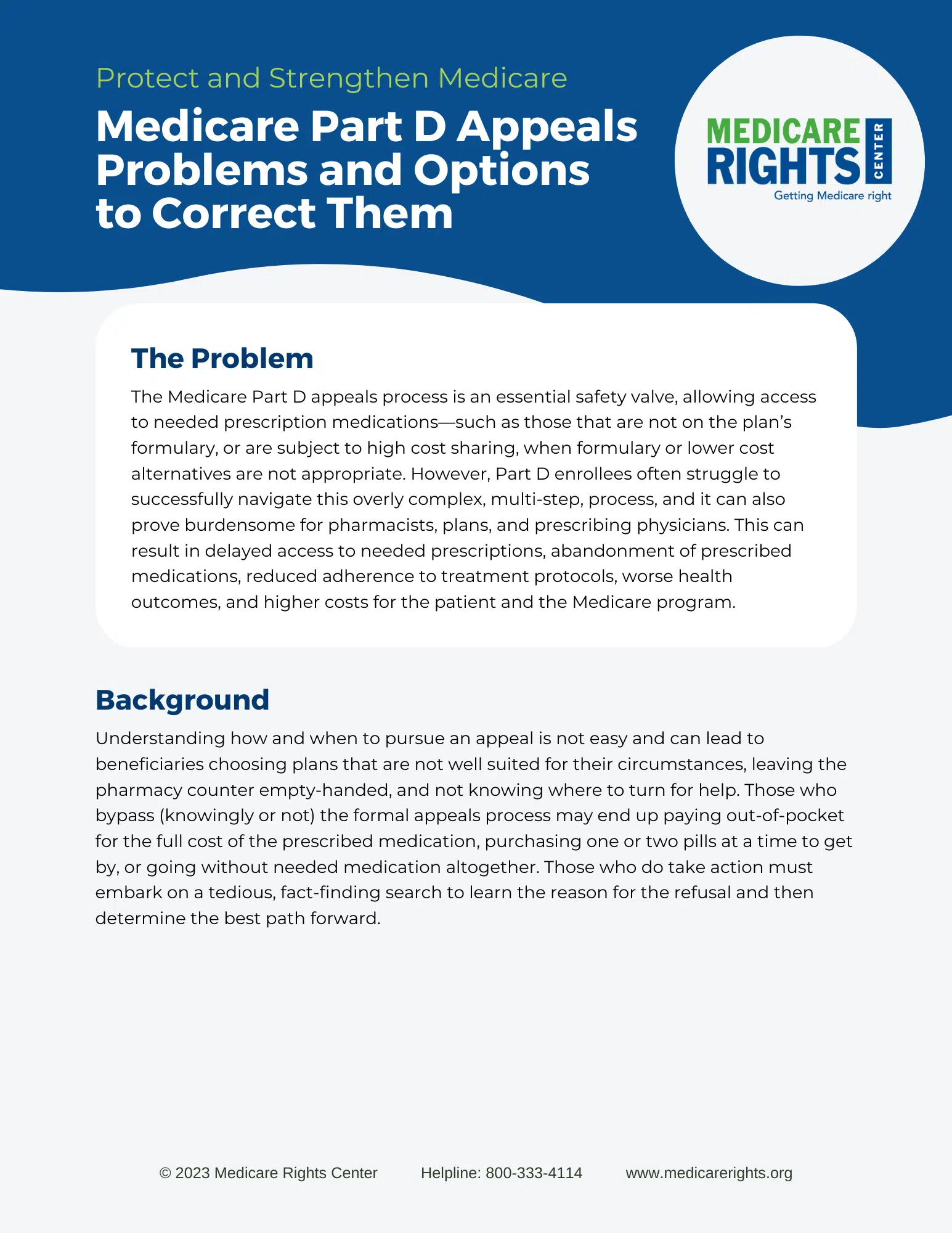
Medicare Rights’ Helpline Trends Report Shows Increasing Need for Help Affording Care
This week, we at Medicare Rights released our annual Medicare Trends Report, which features key challenges facing people with Medicare
Join Us Live for a Discussion on Medicare, Democracy, and the Future of Health Care
Largely driven by prior authorization, MA and Part D coverage denials leave beneficiaries with only bad options: paying out-of-pocket, going without, or getting embroiled in a daunting and deeply flawed appeals process. Each path can lead to delayed care, abandoned therapies, worse health, and higher costs. Particularly egregious are improper coverage denials, which force people to make this choice unnecessarily. Changes are long overdue. Harmful denials must be curbed, and the appeals systems must be reformed to function as a safety valve—rather than as an inadequate substitute for sound plan decisions and robust federal oversight.

This week, we at Medicare Rights released our annual Medicare Trends Report, which features key challenges facing people with Medicare
In 2022, Medicare Rights staff and volunteers addressed more than 27,000 questions through its national helpline and professional email channels. Additionally, Medicare Rights’ free and independent online reference tool, Medicare Interactive (MI), provided more than 2.6 million answers for beneficiaries, their caregivers, and professionals. This report features the top helpline trends and highlights the most commonly sought helpline and Medicare Interactive answers, providing a glimpse into the various questions and needs of Medicare beneficiaries, caregivers, and the professionals assisting them in the community in 2022.
The Medicare Rights Center (Medicare Rights) appreciates this opportunity to comment on the Advancing Interoperability and Improving Prior Authorization Processes proposed rule.
Prior authorization is creating an ever-increasing burden on patients. We support many of the Centers for Medicare & Medicaid Services (CMS) provisions in this proposed rule that would reduce this burden by improving processes, timelines, access to information, and communication.

The Medicare Part D appeals process is an essential safety valve, allowing access to needed prescription medications—such as those that are not on the plan’s formulary, or are subject to high cost sharing, when formulary or lower cost alternatives are not appropriate. However, Part D enrollees often struggle to successfully navigate this overly complex, multi-step, process, and it can also prove burdensome for pharmacists, plans, and prescribing physicians. This can result in delayed access to needed prescriptions, abandonment of prescribed medications, reduced adherence to treatment protocols, worse health outcomes, and higher costs for the patient and the Medicare program.

The Centers for Medicare & Medicaid Services (CMS) recommends policy changes to Medicare Advantage (MA) and Part D plans each
The Medicare Rights Center comments on the Medicare Program; Contract Year 2024 Policy and Technical Changes proposed rule.

This is part 3 of the helpline trends report series. Read part 1, part 2, and part 4. This third

This is part 2 of the helpline trends report series. Read part 1, part 3, and part 4. This second

In recent months, the Medicare Rights Center has been helping ensure that important health care reforms are included in the

This week, as Congress continued to discuss strategies to improve health coverage, Medicare Rights weighed in, urging them to prioritize critical

This week, we at Medicare Rights released our annual Medicare Trends Report, which features key challenges facing people with Medicare
In 2022, Medicare Rights staff and volunteers addressed more than 27,000 questions through its national helpline and professional email channels. Additionally, Medicare Rights’ free and independent online reference tool, Medicare Interactive (MI), provided more than 2.6 million answers for beneficiaries, their caregivers, and professionals. This report features the top helpline trends and highlights the most commonly sought helpline and Medicare Interactive answers, providing a glimpse into the various questions and needs of Medicare beneficiaries, caregivers, and the professionals assisting them in the community in 2022.
The Medicare Rights Center (Medicare Rights) appreciates this opportunity to comment on the Advancing Interoperability and Improving Prior Authorization Processes proposed rule.
Prior authorization is creating an ever-increasing burden on patients. We support many of the Centers for Medicare & Medicaid Services (CMS) provisions in this proposed rule that would reduce this burden by improving processes, timelines, access to information, and communication.

The Medicare Part D appeals process is an essential safety valve, allowing access to needed prescription medications—such as those that are not on the plan’s formulary, or are subject to high cost sharing, when formulary or lower cost alternatives are not appropriate. However, Part D enrollees often struggle to successfully navigate this overly complex, multi-step, process, and it can also prove burdensome for pharmacists, plans, and prescribing physicians. This can result in delayed access to needed prescriptions, abandonment of prescribed medications, reduced adherence to treatment protocols, worse health outcomes, and higher costs for the patient and the Medicare program.

The Centers for Medicare & Medicaid Services (CMS) recommends policy changes to Medicare Advantage (MA) and Part D plans each
The Medicare Rights Center comments on the Medicare Program; Contract Year 2024 Policy and Technical Changes proposed rule.

This is part 3 of the helpline trends report series. Read part 1, part 2, and part 4. This third

This is part 2 of the helpline trends report series. Read part 1, part 3, and part 4. This second

In recent months, the Medicare Rights Center has been helping ensure that important health care reforms are included in the

This week, as Congress continued to discuss strategies to improve health coverage, Medicare Rights weighed in, urging them to prioritize critical